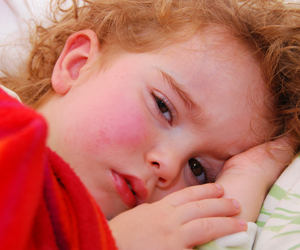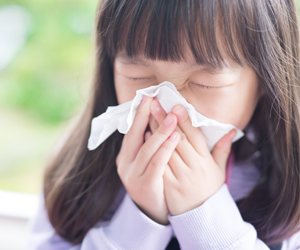
When should nurseries exclude children for sickness?
With cold and flu season peaking in winter, Julia Sudbury of Cambridge Early Years takes a look at when nurseries should exclude children for sickness.
It’s a fact of life that nurseries and childcare settings are common sites for the transmission of illness and infection.
But when is reasonable for you to exclude children from your nursery for sickness, and how do you communicate this to parents?
First, let’s look at why children are susceptible to becoming unwell
There are a number of reasons why children are more susceptible to becoming unwell:
- Immature immune systems
- The way they play, interact and have close contact with each other
- Sometimes having no or incomplete vaccinations
- Having a poor understanding of hygiene practices.
So how can we combat this, if at all? Well, nurseries can most certainly support children’s understanding of hygiene through reinforcing hand-washing and learning about germ-spreading.
How should you manage sickness in your nursery?
A good place to start is to look at official guidance and legislation around the management of illness in childcare settings.
In England:
The provider “must have a procedure, discussed with parents and/or carers, for responding to children who are ill or infectious, take necessary steps to prevent the spread of infection, and take appropriate action if children are ill.” – the Statutory Framework for the Early Years Foundation Stage.
In Scotland:
According to Care Inspectorate, settings are required to have policies in place which ensure infection control, and what parents should do if, and when, their child is ill.
In Wales:
The Welsh Government National Minimum Standards for Regulated Childcare (Standard 10: Healthcare)
“The registered person is responsible for ensuring that: 10.1 the good health of children is promoted and positive steps are taken to prevent the spread of infection with appropriate measures taken in cases of illness;”
The official childcare guidance should form the basis of your policies and procedures on how to manage when children in your setting are unwell.
My advice would be to have a clear written policy and as part of your induction process for both staff and parents.
Make sure you share a copy with parents and get them to sign it to say they have read and understood it too.
When can and can’t a child attend your setting?
The NHS website, Public Health England, Public Health Wales and NHS Health Scotland all have clear guidance on a range of common childhood illnesses, and these should be your first port of call when deciding if a child can be at your setting or not.
It can be a good idea to have guidance or posters displayed in your setting, so you can easily refer to them when having discussions with parents.
 Being upfront with parents about when they may be asked to keep their child at home usually helps to prevent difficulties in the future.
Being upfront with parents about when they may be asked to keep their child at home usually helps to prevent difficulties in the future.
Examples of common illnesses
Here are some examples of the more common illnesses you are likely to see in your setting from Public Health England’s comprehensive list:
- Chickenpox – kept away from settings for a minimum of 5 days AND until ALL the spots have crusted over
- Hand, Foot and Mouth – no requirement to exclude children as long as they are well in themselves
- Diarrhoea and/or vomiting – should be kept away from the setting for a minimum of 48 hours after the last episode of either runny stools or sickness
- For example, if a child goes home unwell on a Monday afternoon, but doesn’t have their last loose nappy until 10 pm on Tuesday night, they can’t return to your setting until the Friday
- Conjunctivitis – usually no requirement to exclude children, and treatment is often not given by GPs
- However, if you have multiple cases at a setting you should contact your local health protection team to discuss the situation further
- Head lice – no requirement to exclude children.
This is not a comprehensive list and further guidance can be found here.
You should also be aware that some conditions are considered notifiable diseases and you may have to link with your local health protection team with regards to these. Again, full information can be found from the Public Health Guidance.
Remember, where exclusions are advised, these time-frames also apply to your staff.
What about coughs, colds and ear infections?
While there is no specific guidance on children attending your setting with coughs, colds or ear infections, there are some basic principles you can apply to decide whether they should be in your care or at home.
As a general rule of thumb, you and the parents should be considering both children’s emotional and physical well-being when deciding if they are well enough to be at your nursery.
If a child is really unwell or in pain, then a busy setting probably isn’t the right place for them.
A setting is not able to offer the one-to-one cuddles an unwell child needs, or the quiet environment where they can sleep and rest. If a child is unwell, then home probably is the best place for them.
This, of course, doesn’t mean every child with a cold or ear infection needs to be at home – far from it. Many will cope just fine with their usual day.
So how do you decide when a child should be at home and how can you make this decision transparent to parents?

Knowing what a ‘well child’ is for your nursery
One way to manage sickness at your nursery is to have a definition of a ‘well child’ built into the policy that you share with parents.
At Cambridge Early Years, when helping settings to pull together policies and procedures, this is the definition we use:
- A child who is happy and able to take part fully in nursery life
- A child who does not have a temperature
- A child who is not dependent on Calpol
- A child who is not reliant on 1-1 care.
In my experience as a nursery manager, it has been very helpful to have this definition clearly in place and understood by all parents.
It can help to avoid many difficult conversations when supporting families to deal with the inconvenience of their child not being able to attend the setting.

This blog post was written by Julia Sudbury of Cambridge Early Years.
- Illness
Similar Articles
Top tips: Supporting your team’s well-being

Early years activity: Frozen balloon explorers


